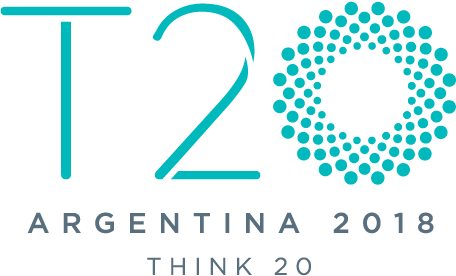Rafael Rincón-Urdaneta, director of Strategy and International Relations at the Fundación para el Progreso, summarized the work carried out by the Task Force during the Inception Workshop.
The G20 is an international forum of cooperation that brings together 19 countries, as well as the European Union, to address global challenges. Thank to the Argentine presidency of the group, the Think 20´s (T20) Inception Workshop took place last week in Buenos Aires where a network of people and organizations came together to add value to the G20 process with proposals and recommendations.
The whole conference was a stimulating hurricane of astonishing news and challenged attendees´creativity and intelligence, particularly the Task Force on the future of work and education in the digital age. Here is a list of five great ideas that were present throughout the conference and what business, political and cultural leaders in Chile should have in mind every second.
- The future is happening now: Talking of “what is to come” and how to prepare yourself for the future has little attraction in political language. In the realm of immediate demand, where every demand is followed by a now! (bonuses now! things for free now! housing now!), tomorrow is not very competitive compared with the populist possibility of a “solution” to be blown away in the wind. Truthfully, this no longer has the same meaning. The exponential advancement of technology is so rapid, Moore’s Law and such, that it appears that the future has already arrived as a disruptive force that doesn´t forgive those who are distracted. It can also be compared to a sudden furious wave which leaves two alternatives: to surf with dignity and give a decent performance, or to drown. The idea that the future is happening now, which someone said at the event, gives a sense of urgency to political, business and social actions and decisions which should have been taken a long time ago. The Estonians, with their e-Estonia, have had this vision for years and they are setting an example. Almost paraphrasing Pau from the Spanish comedy film “Spanish Affair”, the hashtag for our organizations, governments and lives should be #TheFutureisHappeningNow.
- Evidence and strategy above all: There is no space, time or patience for ideological bla bla or theoretical fundamentalism. This includes “well intentioned” experiments which end up as failures which could have been prevented and avoided. It is time for responsible leadership, which it has always been time for, and that means working with evidence in hand, adequate diagnostics, directives steered by the brain (not by our stomach) and timely and coherent actions. The next government and all Chilean leadership, in the public and private spheres, are right at the most spectacular turning point in the history of humanity. They will only be able to capitalize on this with intelligence, an active radar 24/7 and a good sense of judgement to manage opportunities and threats and to face social tensions which the uncertainty promises to, and will, fulfil.
- Rethink and reset: Saying that “the only constant is change” is a nice slogan, but insufficient. It has probably never been so necessary or urgent to rethink so many things and to press reset to delete intuitions and rationale which we have used for so much time. Kodak didn´t rethink anything when Steven Sasson presented him with a digital camera in 1975 with its “poor” 0.01 megapixels. Kodak didn’t understand that the future was knocking on his door and he certainly did not open himself to change, or the need to reset his linear logic in the face of an exponential phenomenon, and he was left behind.
- Let your imagination fly: This is a nice saying too but it’s not for show. It has very important effects. When an expert at the event was asked which jobs will disappear, he responded that we need to ask ourselves about the jobs we haven’t invented yet. The world of creation in the digital world is impressive and our modest heads are barely able to understand it. Just like it was a few years ago when there were no community managers, drone rental businesses or digital applications like WhatsApp or Instagram which are worth billions, nowadays people provide services, goods and jobs that we still do not imagine. We are in the era of creators, massive innovation and disruption rather than in an era of entrepreneurship and entrepreneurs. Imagination and creativity will be, and already are, extremely vital that they should not be missing as skills in educational models and in private and public organizations.
- People – more important than ever: During the discussions a reference to a Swedish minister was made who once said “We won’t protect jobs. But we will protect workers”. In December 2017, the Swedish State Secretary Eva Lindström published on her Twitter account an article about how Sweden is facing up to the challenge of robots and jobs. She did it while paraphrasing a quote, mentioned above, while making a call to have strong trade unions (in a Scandinavian manner, of course), free education, and a policy for innovation and growth. What I want to emphasize here, beyond the specific measures, is the focus: to truly think in people means searching for strategies to resolve problems from a perspective adequately orientated to adaptation, to the learning of new skills, creativity and reinvention. The focus of some of our trade unions and politicians suggest hindering progress, growth and new technologies in order to maintain old trades. They will crash hopelessly and harm a lot of people.
Written by Rafael Rincón-Urdaneta, director of Strategy and International Relations at the Fundación para el Progreso.
*The original version of this article (“Cinco grandes ideas del T20 para Chile”) was published in Spanish on 8 February 2018 in El Libero.
